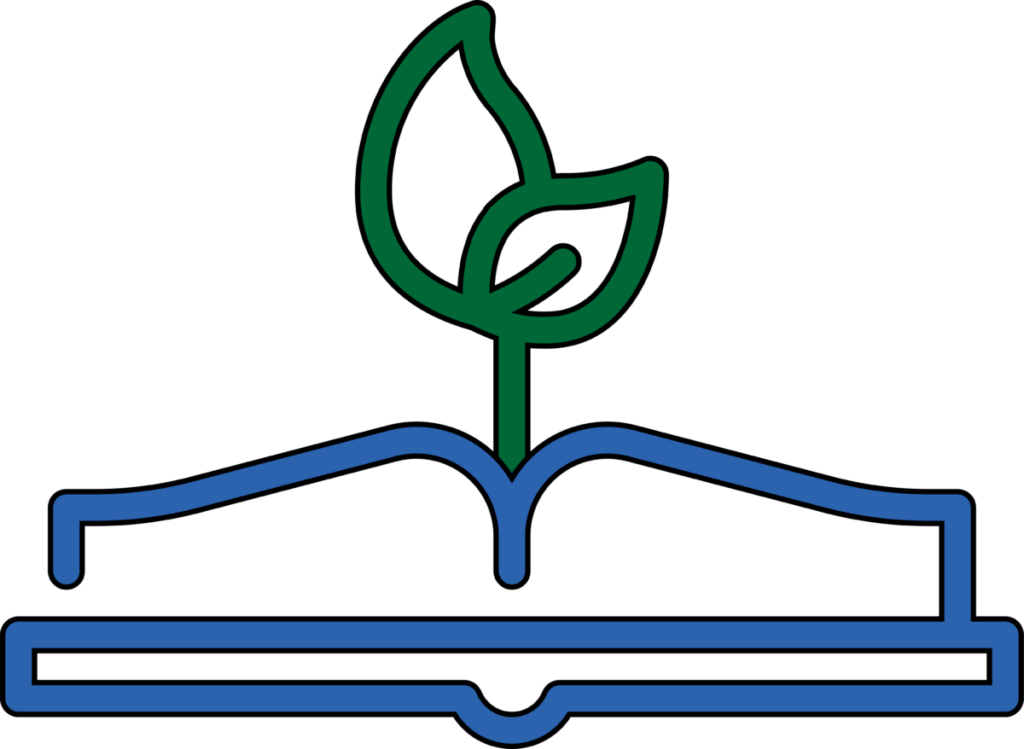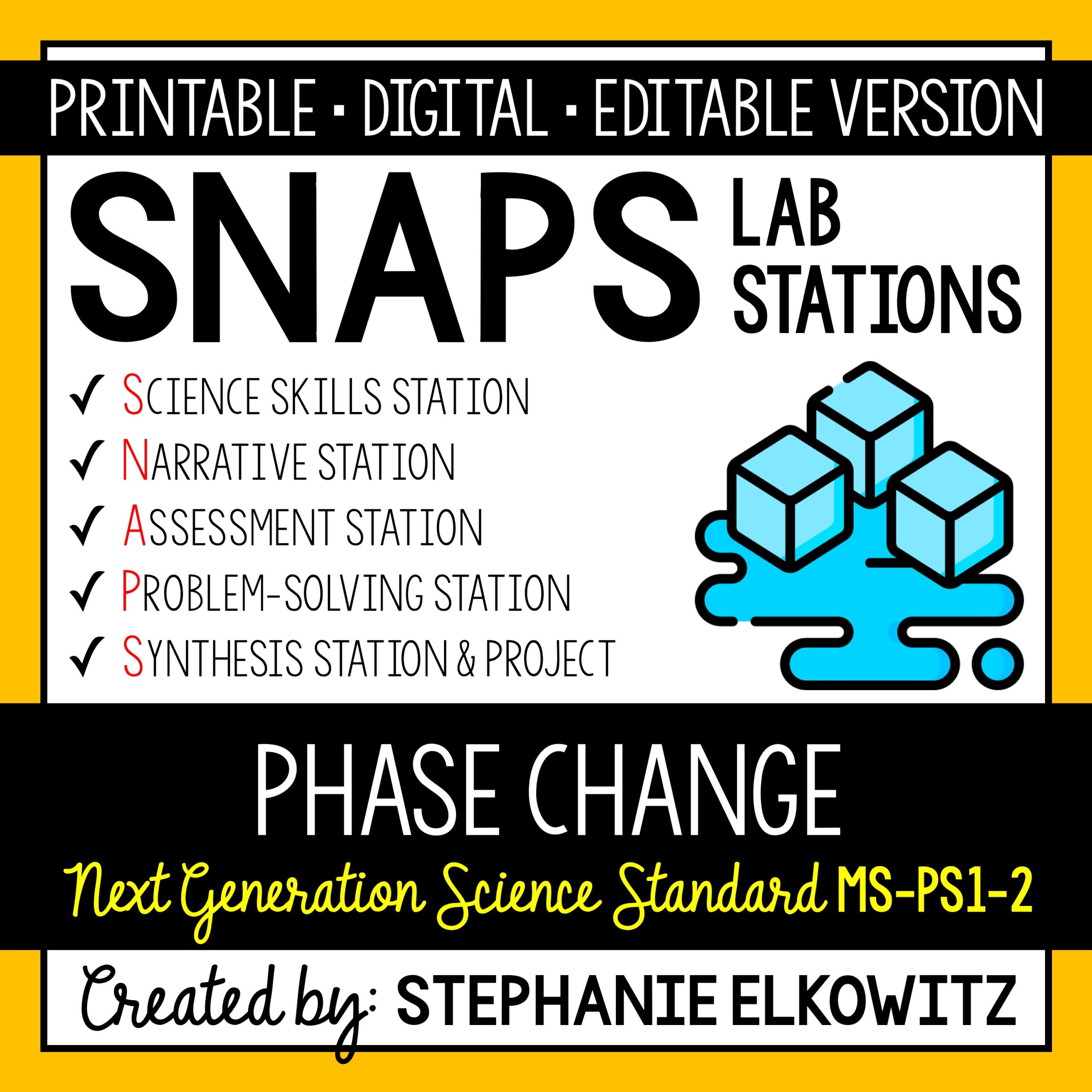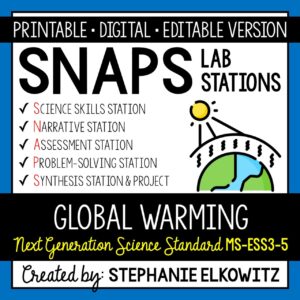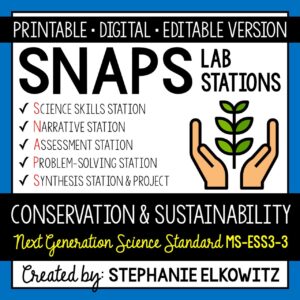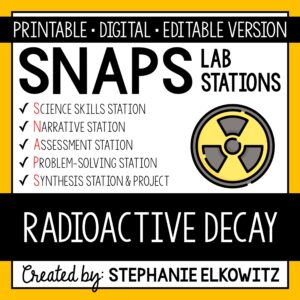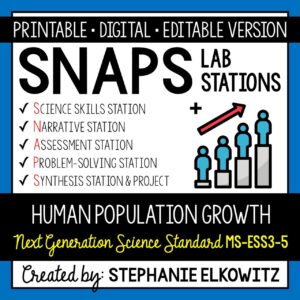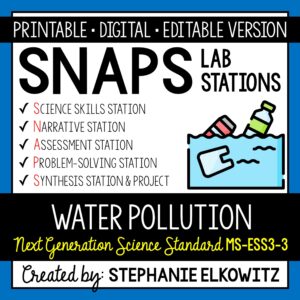5-PS1-2 Phase Change Lab
$7.00
An engaging lab activity designed to enhance students’ understanding of how a substance’s state of matter changes when thermal energy is added or removed. Aligned with NGSS 5-PS1-2.
Description
5-PS1-2 Phase Change Lab Preview
SNAPs Lab Stations Activities require students to use science, math, literacy, problem-solving and engineering skills. They are designed to enhance students’ understanding of scientific concepts and help students apply scientific ideas to the real world. Each station activity promotes skills so to develop students into proficient and competent scientific thinkers.
SNAPs lab activities have five components:
• Science Skills Station to develop science skill proficiency
• Narrative Station to build science literacy
• Assessment Station to evaluate learning and understanding
• Problem-Solving Station to foster engineering design
• Synthesis Station and Project to inspire higher-order learning
DIGITAL LABORATORY – DISTANCE LEARNING & DIGITAL CLASSROOMS
• This lab is offered in a digital format to support digital classrooms & distance learning.
• The digital lab activity is designed to work with Google Slides and Microsoft PowerPoint
• The digital lab activity CANNOT be edited. However:
– Students can manipulate text boxes
– Students can create tables, graphs and diagrams
– Students can insert images and drawings
GOOGLE FORM ASSESSMENT STATION
• The assessment station is offered as a self-grading Google Form.
• Questions are all short answer and are 100% editable.
• Suggestions for use are included in the download.
DISTANCE LEARNING COMPATIBILITY
SNAPs lab activities are rated for their ease with distance – independent learning. Refer to the preview for more information about how well this laboratory works in a fully digital classroom and with distance learning.
EDITABLE DOCUMENTS
This download includes an editable word document (docx file) of all lab components:
• Pre-Lab and Post-Lab Activities
• The Lab Overview
• Lab Station Activities and Questions
• Directed Synthesis Project (when applicable)
Important Notes:
• Diagrams, illustrations, tables and graphs essential to lab activities are included
• Illustrative clipart is NOT included
• Editable documents and rubrics are included with the FREE SNAPs Setup Guide
Editable files allow you to:
• Edit the scope of the activities so to suit your students’ needs
• Edit the materials required based on resource availability
• Create single-period “mini-labs” using activities at the individual skills stations
The activities at each station in this lab are detailed below.
Phase Change Lab Stations Activity Learning Objectives
1. Describe what happens to a substance’s state of matter during a phase change.
2. Compare and contrast how a substance’s state of matter changes when thermal energy is added or removed.
3. Apply the Law of Conservation of Mass to phase change.
4. Manipulate water’s freezing point for practical use.
Science Skills Station
Students will observe the phase change of water. They will measure the temperature of the water as it undergoes melting and evaporation. They graph the temperature change of the water over time and determine water’s melting and boiling point.
Narrative Station
Students will read an informational text about the four major types of phase change. Students will analyze a student’s investigation to understand what happens to the mass of a substance as it undergoes a phase change.
Assessment Station
At this station, students will answer questions about key terms and ideas relating to phase change. Students must employ lower, mid and higher order thinking skills to answer these questions.
Problem-Solving Station
Students will model how adding salt to water lowers the freezing point of water. They will design the optimal mixture of salt and water, which considers how well the salt lowers the freezing point as well as the cost of salt. Students will be constrained in the time and resources available while designing the solution.
Synthesis Station
Students will compose a CER (claim-evidence-reasoning) report to summarize the lab. Students are provided the claim statement and must support the claim with observations, data and other information gathered in the lab. Students will explain how the evidence supports the claim using scientific reasoning.
Synthesis Project
Students will have a choice of 11 projects. Refer to the SNAPs Lab Stations Best Practices and Setup Guide for directions and suggestions on how to conduct the project.
This download includes:
• A pre-lab assignment and post-lab reflection
• Directions and questions for each lab station
• Student recording sheets
• Teacher Key
Additional Materials Required:
2 Scales
2 Thermometers
2 Graduated cylinder
1 Stopwatch
2 Beakers (Heat resistant)
Ice
Water
Salt
Hot Plate
Gloves and tongs (to handle hot glassware)
Note: Students will handle HOT water and glassware at the science skills station. If your students are not able to complete this activity on their own, perform this station as a ”class activity.” You (the teacher) should perform the steps of the activity while the class observes. Students should record the data while you carry out the activity.
NEXT GENERATION SCIENCE STANDARDS
This laboratory satisfies NGSS 5-PS1-2. It combines the three dimensions of science learning – science and engineering practices, disciplinary core ideas and crosscutting concepts – to meet the standard. This lab also makes interdisciplinary connections to STEM, Math CCSS and ELA CCSS to build the appropriate skills.
TERMS OF USE
• All rights reserved by Stephanie Elkowitz.
• This product is to be used by the original purchaser only.
• Intended for classroom and personal use only.
• Copying for more than one teacher, classroom, department, school, or school system is prohibited.
• This product may not be distributed or displayed digitally for public view.
• Failure to comply is a copyright infringement and a violation of the Digital Millennium Copyright Act (DMCA).
